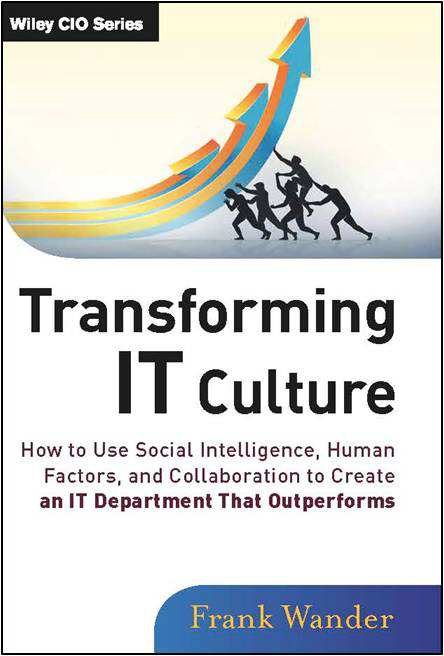 Welcome to a future where professionals count and leaders have the tools and knowledge to unlock the full potential of their talent; where companies are as concerned about their human infrastructure as they are about their networks, storage, and computers; where human understanding is seen as highly productive, and human-centric practices have replaced the selfish, cold, industrial methods that now dominate traditional corporate America. That day now dawns. The pendulum of caring is starting to swing back, and its movement will produce winners and losers. How will things turn out for you?
Welcome to a future where professionals count and leaders have the tools and knowledge to unlock the full potential of their talent; where companies are as concerned about their human infrastructure as they are about their networks, storage, and computers; where human understanding is seen as highly productive, and human-centric practices have replaced the selfish, cold, industrial methods that now dominate traditional corporate America. That day now dawns. The pendulum of caring is starting to swing back, and its movement will produce winners and losers. How will things turn out for you?
The purpose of this article, and my book from which this is excerpted, is to give you an awareness of the human factors of productivity, enabling you to unlock hidden pockets of personal and group effectiveness, thereby ensuring you are positioned for long-term success. Your outcome does not have to be in doubt. Reading this is a meaningful first step in your journey toward a higher level of performance. Enjoy it.
So, how do I know the pendulum is moving? Some things in life are just accidental. As an information technology (IT) leader, I was always very good at strategy, process, and technology, but I also cared deeply about my people and fought to create high-performing cultures where each of them really did count; they repaid the caring with on-time projects, great solutions, deep collaboration, positive social chemistry, and organizational effectiveness. The bargain was unwritten but very clear.
I was given the opportunity to turn around departments that were struggling or deeply in trouble. Soon I was fortunate enough lead turnarounds across companies, and it was then that a pattern emerged: The root cause of failure was the toxic behavior and practices of management itself. These behaviors and practices were not isolated to a company or even an industry: They were part of business. Serendipitously, I had come to see that caring had high productive value, and it was a blind spot. Fortunately, this blind spot has been illuminated, and the pendulum of caring is in motion, even if it isn’t yet visible to you. Higher productivity leads to increased returns on human capital and competitive advantage. The companies that embrace their workers will win; the dinosaurs will fade away.
Once I understood the root cause, I was left wondering why caring is so productive; why caring, unselfishness and human-centric management practices are the key to unlocking knowledge worker productivity. So, I embarked on a research project that has revealed to me why increased human understanding remains an enormous opportunity for traditional corporate America and its workers.
The Passing of an Era
While every era is built on an explosion of understanding, every era gives something while it takes something else away. In the industrial era, we learned to mass-produce goods and held in awe the great machines that turned raw materials into finished products. Unfortunately, craftsmen, the “machines” of the prior era, were dehumanized, becoming nothing more than good hands, mere interchangeable parts, spawning a union movement that won back a measure of self-esteem and control.
Today we have transitioned into the information economy, and a new type of craftsperson has appeared: the knowledge worker. Almost unnoticed, craftspeople have returned, toiling in modern information factories, where they utilize the raw materials of a new era: concepts. By applying networks of minds and emotions, concepts are turned into reality; here deep institutional experience and advanced technical knowledge are a competitive advantage; here human understanding is a lever of productivity; here management remains largely blind to this unfolding reality.
In a stark departure with the past, a socially intelligent and unselfish leadership paradigm will fill the cold vacuum of insensitivity that is part of our industrial heritage. Our factories will buzz with the notion of socially derived productivity, and managers will focus on designing social environments that unlock human output—in addition to managing and controlling the workers. We will learn new forms of measurement that combine both art and science, so that we can peer inside these social systems and see if they are operating effectively.
Refreshingly, we have entered a time that relies on networks of people as the means of production, not machines and process (not to say they won’t be very important). As this era evolves, harmony and happiness will increase, and the economic environment will become inhospitable to the cold and socially insensitive giants of the passing era. They will transform themselves or migrate to foreign environs, where an unchanged economic environment can supply their commodity labor.
With this insight as a backdrop, we can clearly see that the root cause of our repeated failure on large, collaborative IT projects is our ignorance of the human factors of productivity. Figure I juxtaposes our unemotional, cold industrial past and our future, warmed by human understanding.

(Figure I)
A New Era Brings a New Focus
In this new era of the information economy, it is clear that social intelligence, trust, and unselfishness are indispensable management tools that enable a leader to energize a human web and make it highly productive. Executives who can do this will rise in importance as corporate America realizes that each web is a social system—and the social system is the factory. Science has brought an explosion of human understanding. This era will provide the insights necessary to build highly collaborative and productive social systems. As understanding grows, the inhumanity of the prior era will fade away. It is a win-win model, unlocking potential by blending the findings of modern science with age old wisdom:
"Even in such technical lines as engineering, about 15% of one’s financial success is due to one’s technical knowledge, and about 85% is due to skill in human engineering, to personality and the ability to lead people." (emphasis added)
—Dale Carnegie
Fortunately, we have been putting many building blocks in place. Diversity was a training ground that increased our awareness and sensitivity to others. Now we must add a new dimension to our interpersonal understanding by becoming aware of the social, cognitive, and emotional aspects of human collaboration. This growth in our human understanding will become a competitive advantage, as we leverage social intelligence to unleash strengths in others. Although the transition will be difficult, it will be far more difficult for countries deeply tied to the industrial mind-set where workers are just another type of machine—keep it running, and if it breaks down, discard it and get a new one. We are many steps ahead on the pathway to human-centric practices.
As in all changes, this transformation will require understanding, trust, and conviction. We must, therefore, move forward with confidence, recognizing that the emerging environment is hospitable and will sustain us until we reach a much better place. As Buckminster Fuller once said, “You never change things by fighting the existing reality. To change something, build a new model that makes the existing model obsolete.” That is where we are today, in the transition zone: a place where a socially intelligent, servant leadership paradigm will finally begin to reproduce itself. We must work collectively to make sure the new model is seen, understood, and embraced—a set of memes that inaugurates a new enlightenment.
As is well known, cultural change is a complex, time-consuming undertaking. But here there is good news: Changing the focus from self to others is very powerful indeed.
"Self-absorption in all its forms kills empathy, let alone compassion. When we focus on ourselves, our world contracts as our problems and preoccupations loom large. But when we focus on others, our world expands. Our own problems drift to the periphery of the mind and so seem smaller, and we increase our capacity for connection—or compassionate action."
—Daniel Goleman
Leading companies like Google understand that the only shortcut is talent, and they have therefore embraced and nurtured a creative and motivated workforce. Clearly, the winners of this unfolding era will be led by servants who understand how to unlock human potential. Satisfyingly, this understanding will rehumanize the workforce, launching productivity revolutions within corporations that shun selfishness and short-term thinking; those that refuse to embrace their professionals will compete in a race to the bottom.
To fuel this revolution, an explosion of human understanding has arrived on cue. Brain science has revealed how the human mind works, and decades of scientific research has shown how we think and feel. Winning companies will design collaborative cultures where prosocial and caring behaviors give way to positive social chemistry. Here the minds and emotions of the workers will literally flourish, unlocking desperately needed innovation. The hands no longer matter; instead, we will learn to cultivate work environments where the collective state of mind is productive. Nothing is more important.
As you travel on from here, you will find that the journey itself is the reward. Nothing is more gratifying than unlocking greatness in others. As you will experience, the greatest journey lies within.

Written by Frank Wander
Frank Wander is a former turnaround CIO, author of Transforming IT Culture: How to Use Social Intelligence, Human Factors and Collaboration to Create an IT Department That Outperforms, and founder/CEO of PeopleProductive Inc., a company that created first workforce productivity solution for leaders who need to build an agile and innovative culture.



